|
Whiteness Road
Kingsgate on Sea / St Peters
Broadstairs
01843 867764
http://www.captaindigby.co.uk/
https://whatpub.com/captain-digby

Above engraving showing a rescue in 1857. |
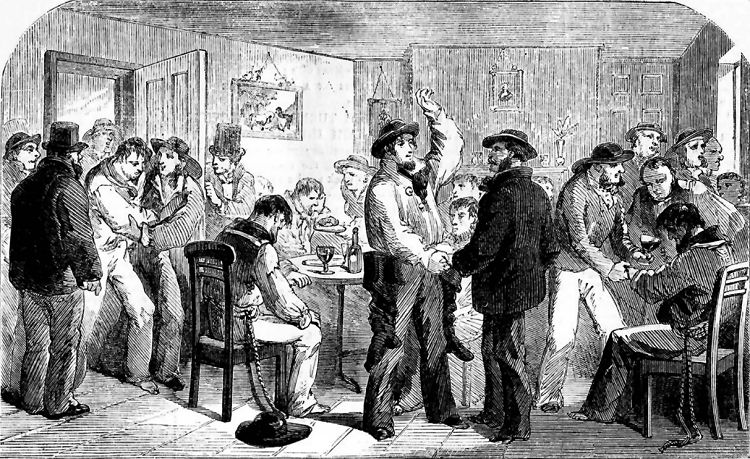
Above engraving showing the little parlour in 1857. |
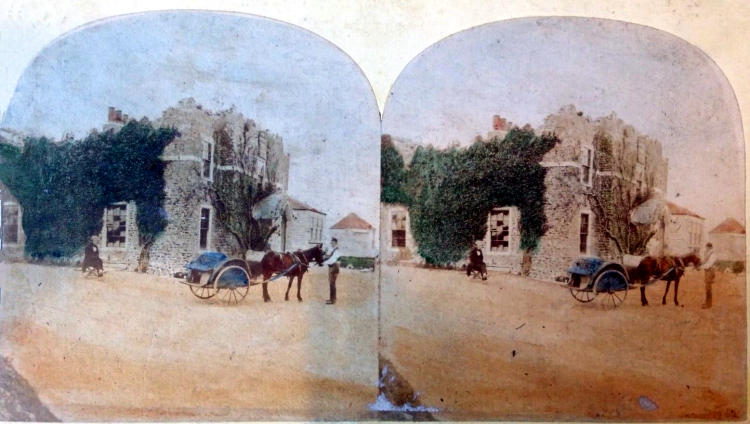
Above stereoscope, circa 1859, kindly sent by Rory Kehoe. |
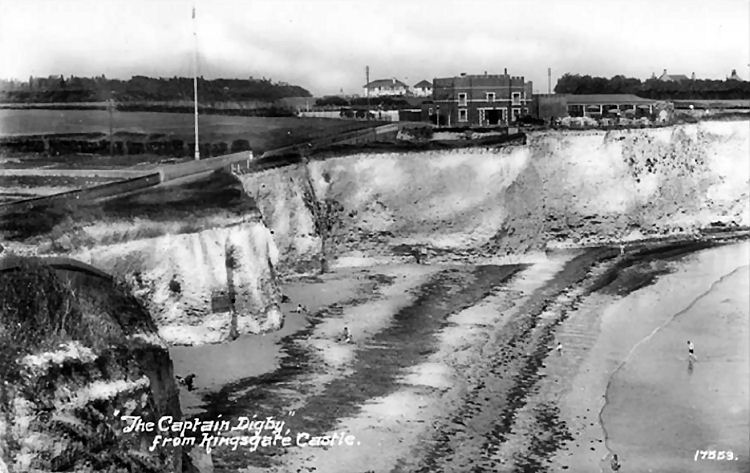
Above postcard, date unknown, looking from Kingsgate Castle. |
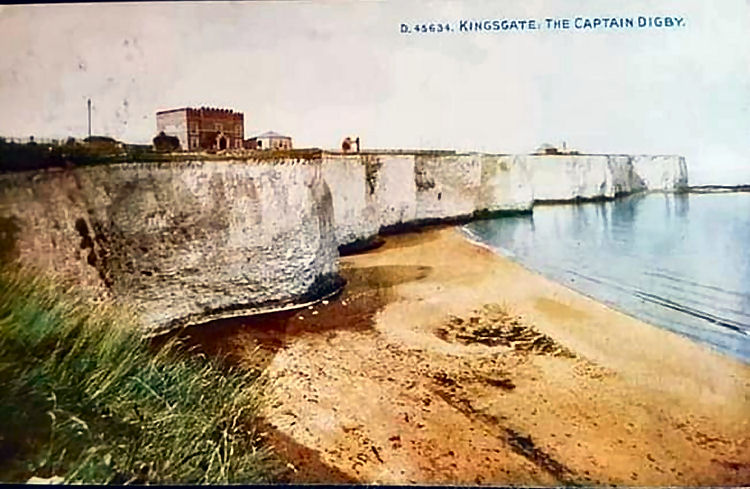
Above postcard postmarked 1912, showing a painting in the style of A R Quinton. |
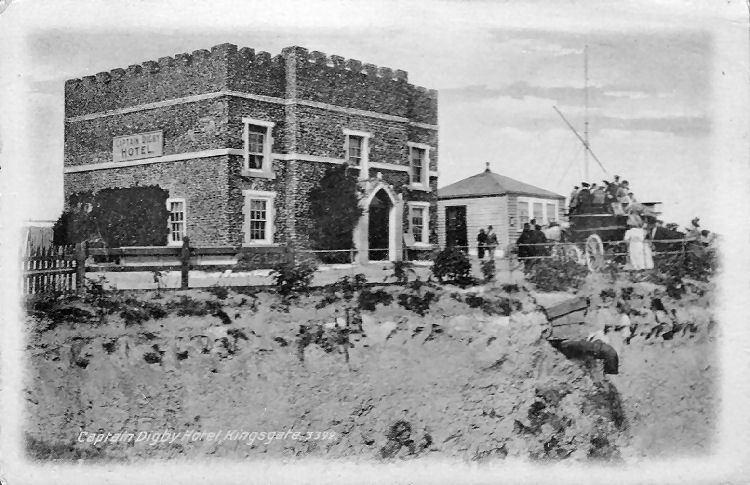
Above postcard, date 1920, kindly submitted by Mark Jennings. |
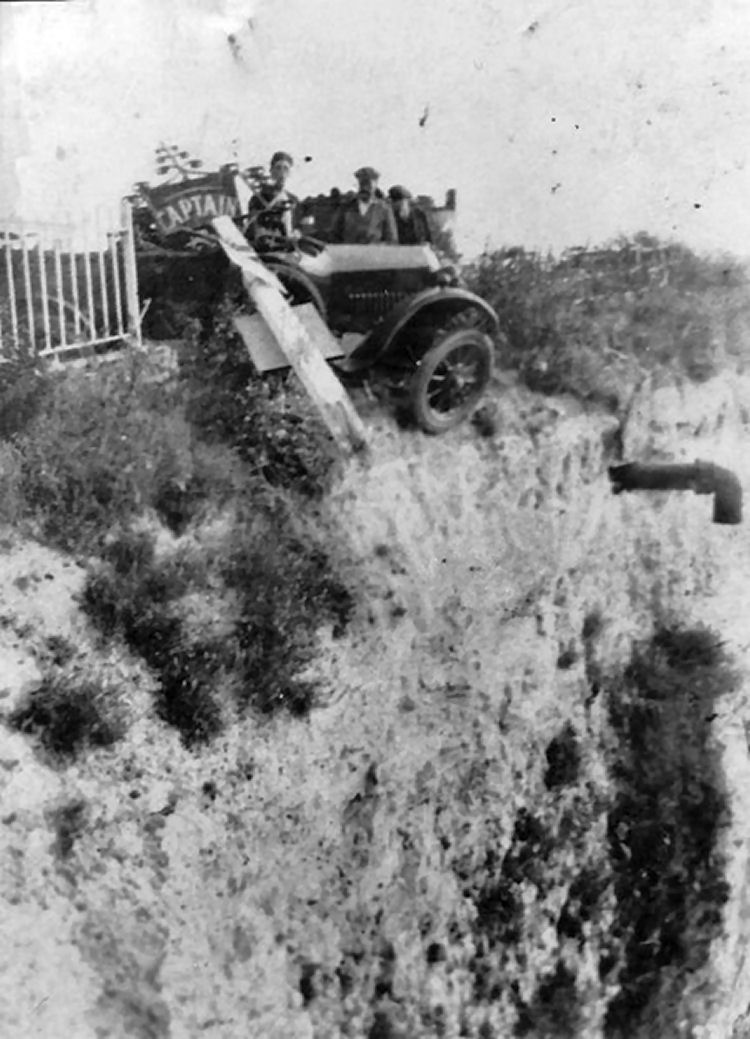
Above photo, 1920s showing a narrow escape, the vehicle taking out the
pub sign. Kindly sent by Michael Mirams who tells me the outlet pipe is
still there in 2021. |
|
Early Broadstairs & St Peters in old photographs collected by Barrie Wootton.

The Daily Mail staff at Kingsgate outside the "Captain Digby" (date
unknown) enjoying what is thought to be a ‘waygoose’, a term used by the
printing trade for a ‘knees-up’. The Daily Mail was Lord Northcliffe’s
own paper, so it is not surprising that the staff outing should travel
to so quiet a spot.
|
|
Early Broadstairs & St Peters in old photographs collected by Barrie Wootton.
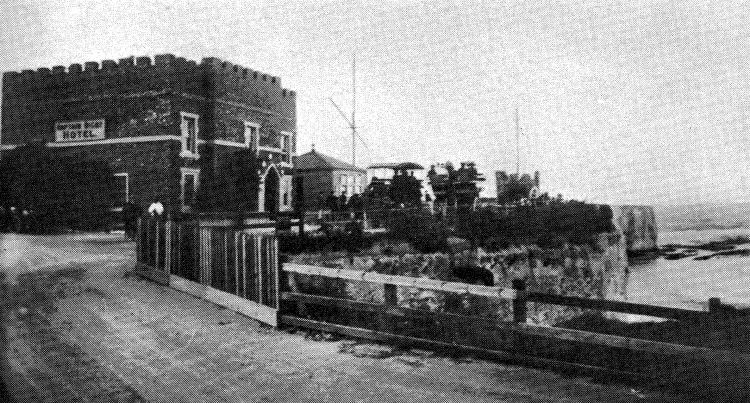
The Captain Digby public house, Kingsgate owes its
existence to Lord Holland who built it between 1763 and 1768. The Digby
was once part of Bede House, half of which collapsed into the sea in
1809, leaving only the stabling which was built upon in 1816 and was
used as a bibitory recess for men and horses (hostelry!). The Digby had
a set of steps down to the shore which were obviously used by smugglers.
It was here in 1857 that rescued men of the Northern Bell were brought
when saved from a watery grave by the two Broadstairs lifeboats off
Kingsgate Bay. Ironically, the Digby is named after Lord Holland’s
favourite nephew, who had a distinguished naval career catching
smugglers.
|

Above postcard, date unknown, kindly submitted by Mark Jennings. |
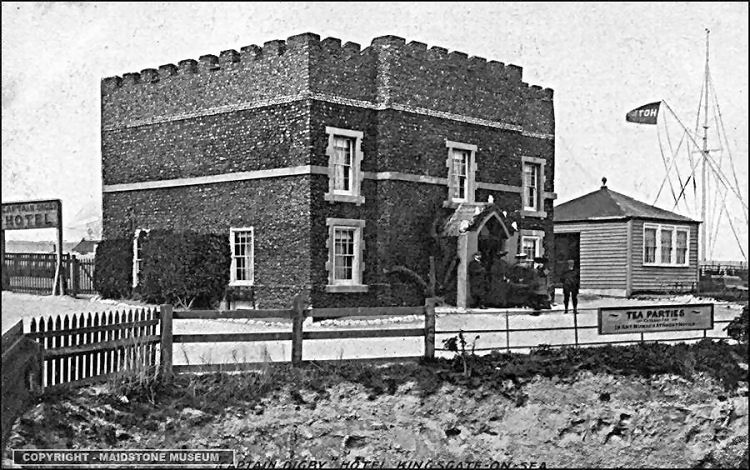
Above photo, date unknown, with permission from Eric Hartland. |

Above postcard, date unknown. |
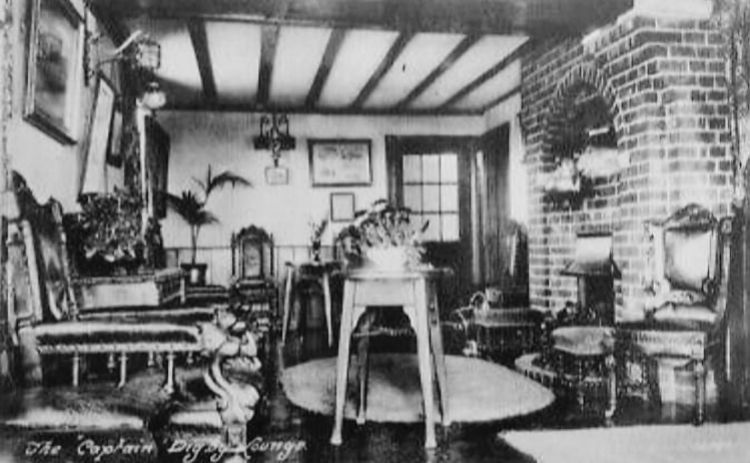
Above photo showing the lounge, 1920. |
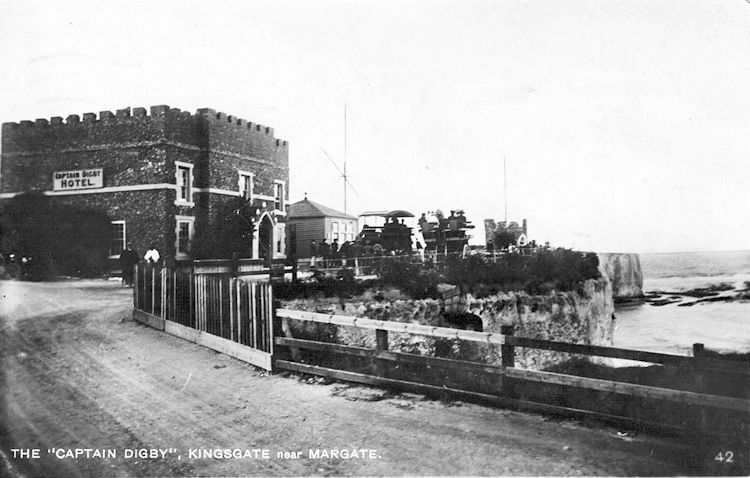
The above postcard, dated 9 September 1930, reported on the back the
following details:- Dear Harry, many thanks for card, I expect you will
have seen we had some excitement here last night, it was a great flare
up, all the inflammable sort of stuff, it went up in a great column of
flame and smoke, it was a miracle none of the adjoining houses caught,
we had a wonderful view from the 3rd floor at the "Marina". There is
nearly always plenty to do here. I had a early "dip" this morning and a
topping morning tennis after..... |
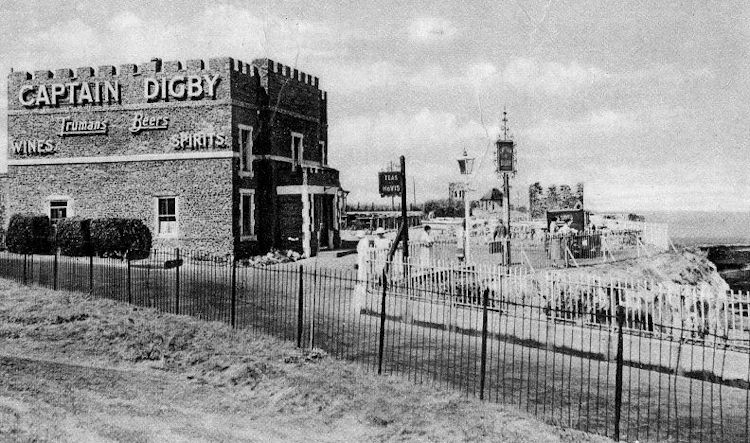
Above photo circa 1934, kindly sent by Rory Kehoe. Showing the pub in
the livery of Truman, Hanbury & Buxton's Black Eagle Brewery, London E1.
Until 1930, the pub had been a tied house, within the estate of
Russell's Gravesend brewery, which T.H. & B. took over and closed. Prior
to this, the pub was probably tied to one of the two Thanet breweries
acquired by Russell's (Webb's Fort Brewery, Margate and James Fleet's
Broad Street Brewery, Ramsgate) around the turn of the 20th century but
it's not currently known which. |
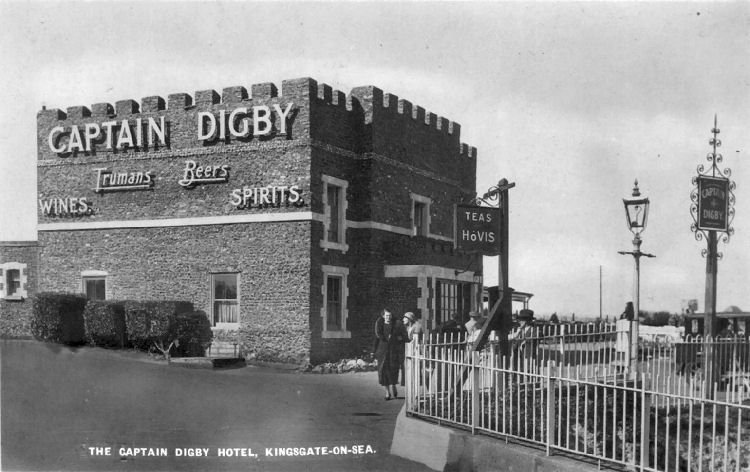
Above postcard, date 1936, kindly submitted by Mark Jennings. |

Above postcard, circa 1936, kindly sent by Rory Kehoe. |
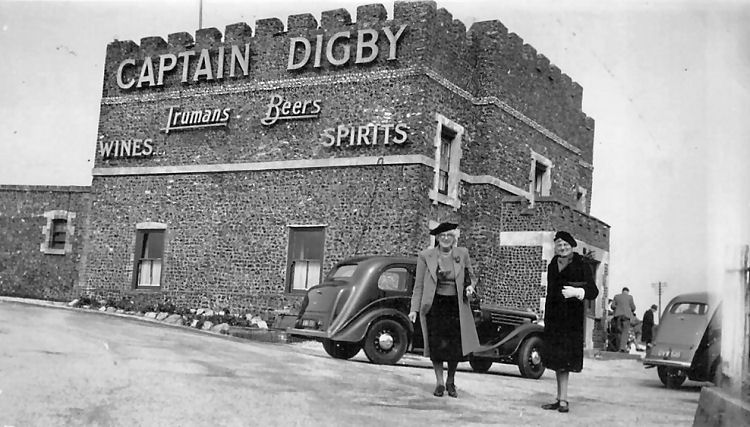
Above photo, circa 1946, kindly sent by Rory Kehoe. |
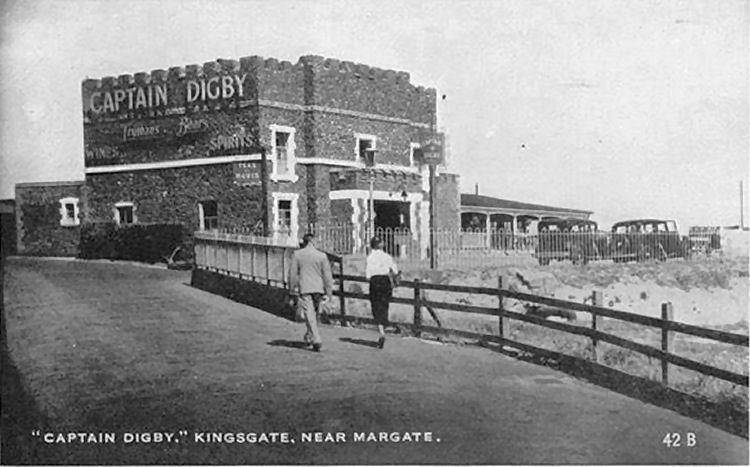
Above postcard, circa 1950s. Kindly supplied by Rory Kehoe. |
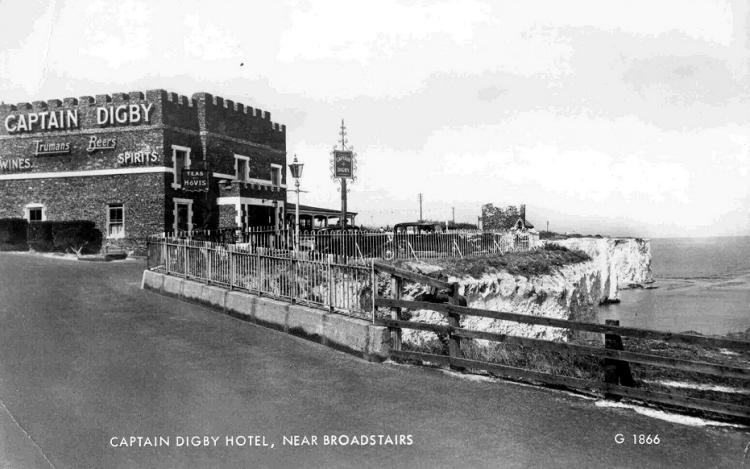
Above postcard, circa 1957, kindly sent by Rory Kehoe. |
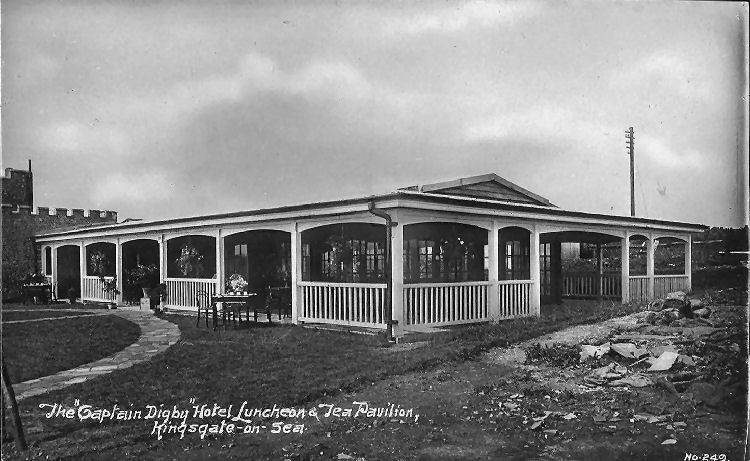
Above postcard, date unknown, kindly submitted by Mark Jennings. |
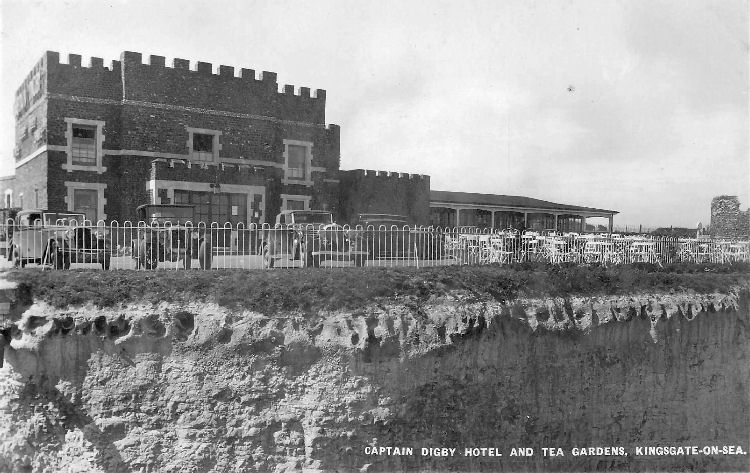
Above postcard, date unknown, kindly submitted by Mark Jennings. |
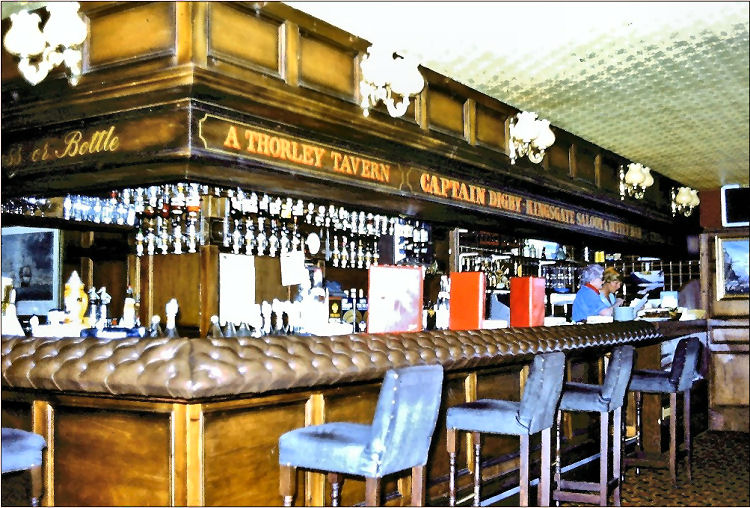
Above bar, date unknown. |
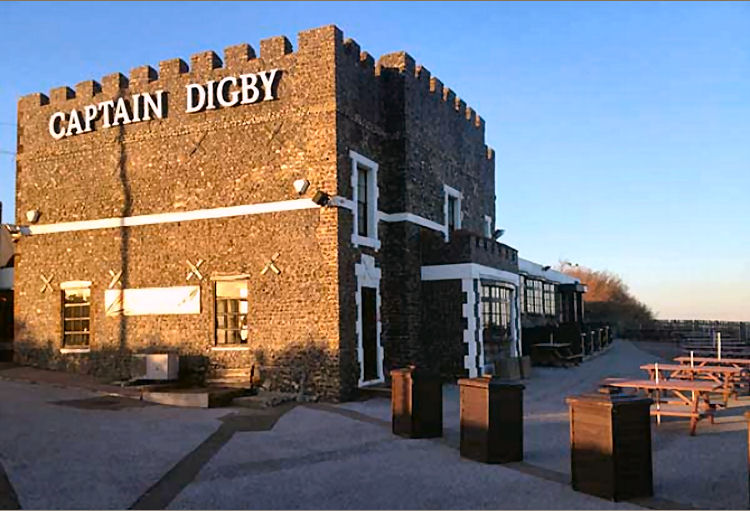
Above photo 2013. |
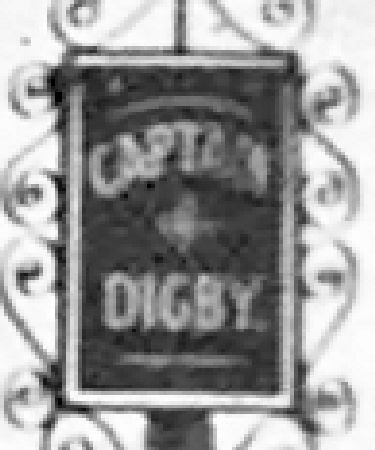
Above sign 1936. |
In 1769, the Battle of Botany Bay took place nearby when Revenue men
ambushed Joss Snelling and his gang as the smugglers unloaded their booty.
Snelling and four others escaped through an opening in the cliffs. A riding
officer was shot on the cliffs and taken to the pub where he died from his
wounds. He haunts the inn, along with the smuggler, Snelling.
A dreadful storm in January 1857 caused an American ship, the Northern
Belle, to anchor off the North Foreland, but the intensity of the gale sent
waves crashing over the vessel and she was driven onto the rocks.
Miraculously her crew, who had lashed themselves to the rigging, were
rescued and taken into the "Captain Digby Inn" at Kingsgate where they made
a swift recovery.
|
THE ILLUSTRATED LONDON NEWS. 17 January 1857.
THE SHIPWRECK OF THE “NORTHERN BELLE.”
What tribute shall we give the brave
Who fight the glorious fight,
Who stand or fall in freedom's cause
Defenders of the right,
Who ward the blow that tyrants deal
And vengeance they would wreak?
The meed they claim—the wreath of fame,
The glory which they seek;
Living, th’ applause of grateful crowds
And pathways fresh with blooms;
And, when they die, the world’s regret
Emblazoned on their tombs.
ii.
And what the tribute greater still
We owe the humbler brave,
"Who, though the light of glory shine
Like sunlight on the wave,
Look up from sunlight to the sun,
And see, through clouds afar,
The fairer ray, more bright than day,
Of Duty’s guiding star;
Who ask no recompense of men,
To save a brother's life?
And shame by greater bravery
The bravest deeds of strife?
iii.
What shall we give them—souls sublime,
Who in the stormy dark,
When frantic seas assault the shore,
And whirl the helpless bark
On treacherous sands, hear far away,
Amid the fitful gale,
The boom of guns, the seaman’s cry,
Or dying woman’s wail,
Then launch their skiff, through blinding foam
Of wild waves tempest-trod,
Their errand, Love; their only guides,
Their own true hearts and God?
iv.
Heroes of Peace ! No pomp of war,
Or sound of fife and drum;
No splendour of the soldiers’ craft,
Or hope of joys to come,
Make quick their pulse with high resolve,
Or nerve their honest hands;
They only feel that Mercy calls,
And at its high commands
They look at peril face to face,
With calm, untroubled eye;
And, when it bursts, undaunted still,]
They meet it—and defy!
v.
What shall we give them? Honor? Fame?
Ay, these, and something mere—’
The gratitude of free men’s hearts,
And tribute from their store;
Yet, not to satisfy a debt
’Twould beggar gold to pay,
But, for example to the world,
High gleaming to the day;
The gallant hearts—the hardy wights—
Who, mid the foam and swell,
Made famous in all time to come
The hapless “ Northern Belle.”
vi.
And those who died—the noble nine?—
When pitying sighs are borne,
We’ll not forget their orphan babes
And widows left forlorn.
If nought can dry those widows’ tears,
And heal the wounded heart,
To help them in their hour of need,
Let England do its part.
Small bounty—great in its intent—
May light their household fires;
And teach their babes in future days
To imitate their sires.
By Charles Mackay. Jan. 14th, 1857.
In last week’s publication we gave a brief notice of the loss of this
vessel, but the brave conduct of the Broadstairs boatmen, through whose
exertions the crew of that vessel were rescued from their perilous
situation, deserves a more extended report.
It was about three a.m. during the dreadful storm on Monday, the 5th
inst., that the Northern Belle, from New York to London, came to an
anchor off Kingsgate, about three-quarters of a mile from the shore. A
few houns later she rode very heavily, and the sea at times broke
completely over her. The crew having cut away the mizen and main masts,
the ship rode easier; but as the gale increased, and as it was feared
that she would part from her anchors and come on shore, a message was
sent to Broadstairs to that effect. The Broadstairs boatmen, who are
renowned for their alacrity, immediately harnessed themselves to the
truck on which the life-boat—the Mary White—is always ready, and
proceeded to drag it from Broadstairs to Kingsgate, a distance of two
miles, over a heavy and hilly country. It was nine o’clock when the boat
arrived at Kingsgate. By that time the news of the ship’s dangerous
position was spread throughout the neighbourhood, and by eleven o’clock
the cliffs wore crowded by persons of all ranks from Margate, Ramsgate,
and Broadstairs. At 11.30 a.m. the multitude assembled were destined to
witness a very painful sight. A Margate lugger, called the Victory, was
hovering about the ship in the hope of rendering her some assistance,
when a huge sea struck her and she suddenly disappeared from eight. She
and her crew went down, and were no more seen. Another lugger, the Octan,
of Margate, had at six a.m. put five hands on board the Northern Belle.
At noon, it was expected every moment that the ship would run on shore
upon the rocks beneath the cliff; but she held on, the crowd remaining
until dark anxiously watching the vessel, despite the hail, sleet, and
snow, which began to descend. Between ten and eleven on Monday night,
the ship parted with her anchor and drove upon the rocks. At that hour
it would have been utterly impossible to launch the life-boat, for the
hail, sleet, and snow prevented the men from seeing any object whatever;
and the spot whence it would be necessary to put off was distant more
than half a mile. When day broke at between six and seven o'clock next
morning, an awful sight was revealed to those on the cliffs and on the
beach. With the naked eye could be seen the twenty-three men lashed to
the rigging of the only mast left standing. With those poor creatures
must have suffered during the night the reader will readily imagine.
At half-past seven o'clock on Tuesday morning the life-boat, the Mary
White, was manned. Since July, 1850, when this boat was presented to the
boatmen of Broadstairs by Mr. Thomas White, of Cowes, she has saved many
lives, and her crew have encountered many dangers; but never had she
been engaged in a matter of such peculiar peril. Ten brave men pulled
through a boiling surf und raging sea, which several times hid them from
sight, and filled all with alarm for their safety. When seven out of the
twenty-three men upon the wreck had been got into the life-boat it was
found necessary to cut her adrift and disentangle her from the ship.
With these seven men the boat returned to the shore amid the cheers of
the many persons assembled on the beach.
A second life-boat, which had also been wheeled from Broadstairs, to be
ready in the event of the first life-boat being lost, was now launched,
and went off to the wreck. She succeeded in bringing away fourteen. The
two remaining were the captain and the pilot, who had been taken in at
Dover. The former declared that he would rather die than leave his
vessel, and the latter expressed a desire to remain and perish in the
old man’s company. After an hour and a half had elapsed the life-boat
for the third time left the shore in order to persuade these two men to
save their lives. After much difficulty the crew of the boat succeeded
in inducing them to come off the rigging and go to the land. It is
impossible to describe the scene on the bench when it was known that all
hands had been saved. A more affecting scene was seldom witnessed. There
were tears of gratitude shed by the Americans, tears of joy and of pride
by the Broadstairs boatmen. Benumbed as the shipwrecked men were, they
could scarcely partake of the refreshment which was provided for them in
the little warm parlour of “The Captain Digby,” the solitary inn which
stands upon the cliff at Kingsgate.
At three o'clock on Tuesday the Mary White was dragged upon her truck by
three horses into Broadstairs. In the boat sat her gallant crow. Tied to
an American oar was the American standard which was so recently hoisted
as a signal of distress. The tattered flag fluttered over the broken
bows of the Mary White. It was thus that the boat passed through the
streets of Broadstairs, amidst the joyous shouts of the inhabitants of
the town. We have engraved this stirring scene.
Nearly all the brave fellows who, at the imminent peril of their own
lives, were thus engaged in restoring to America the lives of nineteen
of those seamen of whom she is so justly proud, are married men with
large families of small children; and there is not a man among them who
has not assisted in saving life, and who has not, at some period, lost a
father, brother, or cousin in the same glorious cause.
A subscription has been opened to reward the deserving and
self-sacrificing conduct of the crews of the two boats; and General
Robert Campbell, the United States' Consul in London, has appealed in
their behalf to the American residents in the metropolis; and Mr. Joseph
Rodney Croskey has generously subscribed £50 to the above fund. Mr.
Laing, in a letter to the Times, states the names of the crews of the
boats, and adds some well-timed details:—
Crew of the Mary White.— John Castle, George Castle, William Hiller
(junior), Robert Miller, James Rowe, George Emptage, Edward Emptage.
This boat saved seven hands.
Crew of the Calmer White on her first trip to the wreck.— John Cowell,
William Wales, Jethrow Miller, John Sandwell, George Emptage, Thomas
Holborn, William Ralph, Robert Gilbert, Robert Parker. Saved fourteen
hands.
Crew of the Culmer White on her second trip to save the Captain and
Pilot.— John Cowell, William Wales, Jethrow Miller, Jerry Walker, Fred
Lawrence, Thomas Sandwell, Robert Simpson, James Bere, Robert Parker,
George Emptage, Alfred Emptage.
These men, sir, were not labouring under any species of excitement when
they engaged in the perilous duty which they performed so nobly and so
well.
Under the impression that these men would never return—the impression of
all who witnessed their departure from the shore—I watched their
countenances closely, There was nothing approaching bravado in their
demeanour—nothing to give a spectator an idea that they were about to
engage in a matter of life or death to themselves and the crew of the
ship clinging to the fore rigging of the Northern Belle. They had no
hope of a "decoration," or of pecuniary reward when, with a coolness of
manner and a calmness of mind which contracted strongly with the energy
of their movements, they "stripped to their shirts*' and bounded into
the Mary White and the Culmer White to storm batteries of billows far
more appalling to the human mind than batteries surmounted by cannon,
and bristling with bayonets. There could be no question about the
heroism of these men. |
The "Captain Digby" is possibly one of the oldest drinking houses in
Thanet. Lord Holland originally built it as a ‘Bede House' between 1763 and
1768. This was a place for drinking and entertainment by Lord Holland's
guests from the impressive Holland House some hundred yards to the south.
The name Captain Digby comes from Robert, a nephew of Lord Holland who
commanded a warship of the English fleet in 1759. It is recorded that when
Lord Holland died he left a sum of money so that Captain Digby's health
could be drunk every year by the customers. Also in his will was a sum to
provide a bottle of wine to every young woman within the parish about to
give birth. Sadly both these provisions seemed to have lapsed through the
years!
By 1797 the ‘Kentish Gazette' records that the tenant, Mr Herbert,
welcomes numerous guests from all the Thanet towns arriving by horse at the
‘Noble Captain Digby'.
On 18th October 1861 the larger part of The Captain Digby fell over the
cliff in a severe storm. A gentleman's magazine of that date reports, “The
Noble Captain Digby fell into the sea, except part of one wing where a
servant boy slept”.
The last remains of the ‘Noble Captain Digby', a flint gazebo situated
right on the edge of the cliff, fell into the sea below during the winter of
1998. The flint rubble was used to build flower planters in the gardens at
‘The Pavillion' on Viking Bay, Broadstairs.
In 1816 the Captain Digby was recreated some yards away from the original
site in the stables of the original Bede House. The present day building is
almost the same as the 1816 building but through the years has undergone
several alterations such as the restaurant, which was added in 1973. I am
informed that this was a Truman tied house at the time.
Beneath the inn is a large subterranean cavern reputed to have been used
by local Kingsgate smuggler, Joss Snelling and his infamous gang. Up to a
few years ago one could reach the beach below by going through a trap door
in the cellar.
In 2001 The Captain Digby won the highly prestigious ‘Family Pub of the
Year' award at the National Publican Awards.
Robert and Hollie have taken the helm here at The Captain Digby and hope
that you have enjoyed your visit, as much as they have enjoyed looking after
you, and in the infamous words of 1797 tenant, Mr Herbert – “Haste ye come
back again!”
Dick Barter informs me that licensee Frank Sparrowhawk (1966-70+) had been part of
Winston Churchill's personal bodyguard during WWII.
|
Kent Gazette Reports 13 September 1805.
Kingsgate, Isle Of Thanet.
To be SOLD By AUCTION, By Messrs SKINNER, DYKE, and Co. On Thursday
the 17th October, at 12 o'clock, at Garraway's House, 'Change Alley,
Cornhill, London, in 4 lots, if not previously deposed of by private
contract.
Lot 1. A CAPITAL FREEHOLD RESIDENCE of handsome elevation, and
suitable for a family of every description, pleasure grounds,
garden, and surrounding land, containing in the whole about Twenty
Acres, formerly the seat of the Late Henry Lord Holland most
delightfully situate at Kingsgate, in the Isle of Thanet, commanding
an uninterrupted view of the sea, and an agreeable distance from the
fashionable and much admired watering places of Margate and
Broadstairs.
Lot 2. An excellent freehold residence, situate in front of the sea,
called the "Castle," a spacious and stately structure, with
coach-house, stabling, and other convenience offices lawn, and
adjoining land, and containing near five acres.
Lot 3. A freehold estate, consisting of the established and well
accustomed Tavern, the sign of the "Noble Captain Digby," with
stabling, and other suitable erections, and about an Acre and a Half
of land, most desirable situated for business, now in the occupation
of Mr. Denn Dunkin, tenant at will, who has noticed to quit at
Christmas.
Lot 4. A freehold Estate, consisting of a substantial brick-house,
barn, stable, and out-buildings, garden, and about 30 acres of land,
extending to the sea, in the occupation of Mr. Denn Dunkin, who has
notice a quit at Christmas. With this lot will be sold, the Pillar
erected to the memorial of the Right Honourable Thomas Harley, Lord
Mayor of London, in the year 1768, and also two other erections,
called Neptune's Temple and Arc Runchim.
To be viewed by tickets only, which may be had of Mr. Gore, Cecil
Square, Margate, or of Messers Skinner, Dyke, and Co. Aldergate-street,
London, who are authorized to treat for the sale by private
contract.
Printed particulars may be had at the "Digby Tavern;" also at
"Mitchener's Hotel," Margate; "Kings Head Inn," Ramsgate; "Fountain,"
and "King's Head Inns," Canterbury; "Rose," Sittingbourne; "Crown,"
Rochester; "Bull and George," Dartford; "Ship," Dover; and at the
place of sale.
Plans of the lots maybe seen at the "Castle," Kingsgate.
|
|
Kentish Gazette 5 January 1819.
A serious accident had well nigh happened to Mr. Surman, on
Wednesday last, he in company with two friends of this town went to
attend a sale at Kingsgate, which not being over before dark, Mr.
Surman left the house on his return home and little mellow, but
being warned by his companions to take care of the Cliff, and in his
anxiety to avoid this Scilla he fell into Chnrybelis, tumbling over
a bank into a horse-pond, with his head half immersed in the water
and his heels in the air he vociferated most loudly for help. One of
his companions, a well-known disciple of Momas, (ancient Green
personification of satire and mockery) proceeded to his assistance,
but the ludicrous position of the old gentleman (his hat and wig
were floating on the waves) so far excited the risible facilities of
his friend as totally to incapacitate from giving the desired
assistants; fortunately the third gentleman making his appearance,
Mr. Surnam was dragged by his heels from his perilous situation, but
so reduced by alarm and by his unpleasant immerse, that he was
unable to stand. He was conveyed back to the public house, and
missing his hat and wig a search was made for them - his hat was
recovered, but his wig (from whatever cause) had sunk to rise no
more. As Mr. Surman was unable to proceed home on foot, Mr. Hill,
the landlord of the Inn, put his horse in his light cart, and the
whole party proceeded in this compliance towards Margate - when, as
if the Demon of Mischief had levelled his whole shaft at Mr.
Surman's bare sconce, the seat of the vehicle gave way, and the
whole party were precipitated to their foundations in the cart; in
this second downfall, the lately found hat missing the adhesive
sociability of his old friends the wig, flew off in a tangent, and
in spite of every search was nowhere to be found. Another hat was,
however, procured from a neighbouring cottage, and the party at
length reached home in safety.
|
|
Kentish Weekly Post or Canterbury Journal 08 August 1823.
THE KING V. RICHARD COOK AND RICHARD AND ELIZABETH HILL.
This was an indictment by information of John Parkinson, employed in the
coast blockade. 'The evidence went to shew that the defendants had
several times offered bribes to the informant, to permit the illegal
landing of contraband goods, at which Parkinson was seemingly conniving,
and at the same time acquainting his officers with the particulars. The
defendants Richard and Elizabeth Hills keep the sign of the Captain
Digby, at Ramsgate, and Cook, the other defendant, was a resident of the
same place. On the 24th of July they offered him £3, to assist in
landing 20 tubs, which he apparently consented to, and at the moment
gave the alarm, when the whole cargo fell an easy prey to the coast
blockade.
|
|
Morning Advertiser 25 November 1823.
THE KING v. COOKE AND OTHERS.
The Solicitor-General prayed the judgment of the Court against Richard
Cooke, Richard Hill and Elizabeth Hill, for a conspiracy to defraud the
revenue.
Mr. Justice Best read the notes of the trial which took place at the
Kent Assizes, before Mr. Baron Graham. The conspiracy was to land
smuggled spirits on the coast of Kent.
[Elizabeth Hill having nearly fainted, was directed to be taken out into
the fresh air.]
The affidavits of the defendants set forth several instances of
dangerous interferences to rescue Revenue Officers in storms and
threatened shipwrecks, and various complaints with which they were
afflicted. The present conviction would operate as a warning to them for
their lives.
Mr. Adolphus, jun. addressed the Court in mitigation.
The Solicitor-General in aggravation.
Mr. Justice Bayley pronounced judgment. - I shall relieve Elizabeth Hill
at once, on account of the state of her health; the Court is not
disposed to inflict any personal punishment, but Richard Hill her
husband, must enter into his own recognizance in £100, for her good
behaviour for five years.— Richard Hill, you had the benefit of a
licence from the Magistrates, and yet you were guilty of this very
serious offence. You are to be imprisoned in St. Augustine, near
Canterbury, for six months in the House of Correction, and pay a fine of
£50; you, Richard Cooke, to be imprisoned in the same place for six
months; and that you enter into real cognizance's for five years each in
£50, and two sureties in £25, for each of you.
|
|
Kent Herald, 31 March 1825.
Marriage.
March 22, at St. Peter's church, Isle of Thanet, Mr. Lucas, Brewer, of Ramsgate,
to Miss Hills, daughter of Mr. Hills, of the "Digby Tavern," Kingsgate.
|
|
From the Kent Herald, 5 April 1827.
Mrs. Hills, the landlady of Kingsgate public house, driving to Broadstairs on
Saturday last, in a donkey cart, was thrown out and fractured her skull. The
poor woman is since dead.
|
|
From the Kentish Gazette or Canterbury Chronicle, 16 January 1829.
DAVIS, Richard:
On Thursday last an inquest was held at the "Captain Digby" public house
at Kingsgate before Matthew KENNETT Esq. Mayor and coroner for Dover and
its liberties on view of the body of Richard DAVIS, when the jury
returned a verdict of “found dead”. It appeared that the deceased who
was servant to an officer in the Blockade Service had been missing since
the evening of the 7th inst, when it is supposed he fell over the cliff
in the darkness of the evening. The surveyors of the parish of St
Peter's it is understood are about to erect a fence to prevent any
further accident.
|
|
From The Era (London, England), Sunday, June 9, 1839; Issue 37.
SALES OF PUBLIC HOUSES.
During the past week the following important
taverns and inns have been submitted to public competition at the Mart
and Garraway's (including:-)
By Mr. Bullock, a freehold inn or public-house, situate at Kingsgate,
Isle of Thanet, known as the "Captain Digby," with stables, out-buildings,
bowling-green, and right of way of tunnel to the sea-shore, £150.
|
|
From the Kentish Gazette, 28 February 1843.
MARGATE.
On Friday se'nnight a fall of cliff took place at Kings-gate; one of the
Coast Guard on duty had been leaning against the rail just before it
went over with the cliff. The carriage road is quite stopped; a
consultation has taken place between the local magistrates with the
surveyor of the parish, on the subject. The inroads of the sea have been
constant for some years at Kingsgate; scarcely a vestige of the former "Digby
Tavern" is remaining, a small part of the foundation only. Within a few
years carriages passed between the Old Tavern and edge of the cliff.
|
|
Canterbury Journal, Kentish Times and Farmers' Gazette, Saturday 17 August 1844.
Important and extremely desirable freehold landed property, in the Isle
of Thanet, comprising a distinguished Marine Residence, two capital
Freehold Residences, a compact Freehold Farm, and a well accustomed Inn.
Mr. Leifchild has been honoured with peremptory instructions from the
proprietor to sell by public auction, at the "Albion Hotel," Ramsgate,
August 21st, at to precisely in various lots,
......
That desirable and valuable Freehold Property, known as the
well-accustomed "Captain Digby Tavern and Hotel," most eligibly situate
by the side of the high road at Ramsgate, leading from Margate to
Broadstairs and Ramsgate.
|
|
From The Essex Standard, and General Advertiser for the Eastern Counties
(Colchester, England,) Friday, July 17, 1846.
NOTICE OF SALE Near RAMSGATE, in the Isle of Thanet
Includes:- Desirable FREEHOLD PROPERTY, known as the well accustomed
"Captain Digby Tavern and Hotel," most eligibly situate by the side of
the high road to Ramsgate, leading from Margate to Broadstairs and
Ramsgate.
The whole of the property may be viewed any time preceding the sale, and
particulars had of Messrs. Winter, Williams and Co.,16, Bedford Row; at
the Libraries and Hotels, Dover, Broadstairs, St. Peter's, Ramsgate,
Margate, and Canterbury; at Garraway's; and of Messrs. Leifchild, 62,
Moorgate Street. (Messrs. Leifchild are the auctioneers and the other
properties being auctioned at the same time include "Kingsgate Castle.")
|
|
From the Kentish Chronicle and General Advertiser, 21 December, 1861. Price 1 1/2d.
MARGATE COUNTY COURT.
The monthly sitting of this court was held at the Town Hall on Monday,
before Charles Harwood, Esq.. judge. There were only 20 plaints issued,
13 of which were settled out of Court, and the only calling for a report
were the following:—
Wales v. Godden.
This was an action brought in the Court of Common Pleas and sent down to
Margate for hearing. The claim was for £4 14s. 4d. for grocery supplied.
The plaintiff formerly kept a grocer’s shop at Broadstairs, and the
defendant keeps the “Digby Tavern,” at Kingsgate.
An articled clerk from the office of Mr. Wetherfield, Loudon, with
permission of his Honour, appeared for the plaintiff. The defendant was
represented by Mr Towne.
The plaintiff was called, and produced her book, in which the defendant
appeared to be indebted to the plaintiff in the amount of £4 14s. 4d.
The plaintiff residing in London an action was brought in the Court of
Common Pleas, and the defendant pleaded never indebted, and that he had
paid the amount previous to being sued.
The plaintiff was severely cross-examined by Mr. Towne.
The defendant’s wife was then called, and denied the debt of £4 14s.
4d., but acknowledged she might owe plaintiff about 20s. The debt from
plaintiff showing was incurred in 1859, and since then she had had a
fire, in which her books were burnt.
His Honour held there was no direct delivery of the goods proved, and in
consequence of the fire the plaintiff was placed in a dilemma.
The
verdict must, therefore, be for the defendant.
|
|
Whitstable Times and Herne Bay Herald, Saturday 20 September 1890.
Broadstairs. Adjourned Licensing Sessions.
The adjourned Annual Licensing Session for Dover and its liberties was
held at Broadstairs, on Wednesday; Sir. R. Dickeson being the presiding
justice. The whole of the existing licences were renewed, with the
exception of that of the "Captain Digby," Kingsgate.
A licence was granted to sell spirits at the "Westgate Private Hotel,"
which was the only new local licence granted by the worship.
The Licence Of The Captain Digby.
We understand that Mr. Burrows, solicitor, has entered an appeal to the
Kent County Quarter Sessions against the decision of the Dover licensing
justices at Broadstairs, last week, refusing to grant a renewal of the
licence of the "Captain Digby," Kingsgate.
The tenant of the public house "Captain Digby," of Westgate, having
last year, and this year been complained of to the Magistrates, and
fined for irregularities, the Bench, after enquiries from Superintendent
Hewell, resolved to refuse to renew the licence. The house was situated
in an outlying district, and owing to its situation, was somewhat
difficult to look after.
|
|
Thanet Times, Tuesday 14 May, 1963.
Marriott. Sparrowhawk.
The engagement is announced between Ralph Marriott, son of Mrs. S.
Roseenbers of Toronto, Canada and Janice Patricia Sparrowhawk, oldest
daughter of Mr. and Mrs. A. W. Sparrowhawk, of the "Captain Digby,"
Kingsgate, Kent.
|
|
East Kent Times and Mail, Friday 22 December 1972.
Death of Former Publican.
A man whose face was familiar to many of the customers having a drink
and chat at the "Captain Digby" public house, Kingsgate, died at the
weekend.
He was licensee Mr. Alf Sparrowhawk, who retired from the clifftop
inn only a few weeks ago.
He and his wife moved into a flat at Kingsgate, but Mr. Sparrowhawk
was taken ill and admitted to Ramsgate Hospital where he died on
Friday.
he leaves a widow and two daughters and the funeral took place at
Thanet Crematorium on Wednesday. Mr. Sparrowhawk was in his early
sixties.
|
|
Thanet Times, 2 August, 1977.
Drama at sea.
Holidaymakers out for an evening seafront stroll on Friday watched as
Margate lifeboat was launched to go to the aid of a stricken cruiser,
the Sovereign.
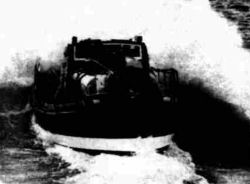 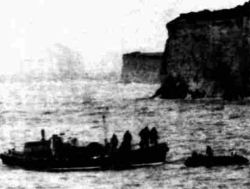 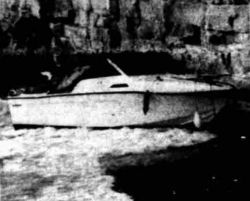
Which had gone aground on the rocks below the "Captain Digby" at
Kingsgate Bay while on a journey from Tower Bridge to Sandwich.
Earlier Margate Inshore Rescue Lifeboat had made its way to the scene
but had broken down before they reach the Sovereign. The lifeboat made a
rendezvous with the inshore craft and the two men crew rowed ashore with
a line to tow off the Sovereign which had damaged its side.
With the help of the two men in the cruiser, brothers Ray and Lou
Lansley, of London both the cruiser and the inshore craft was secured to
the tow line and the lifeboat towed both back to the safety of Margate
Harbour.
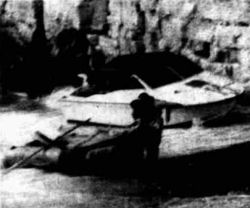 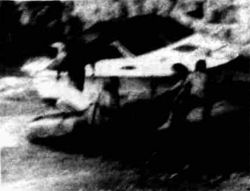 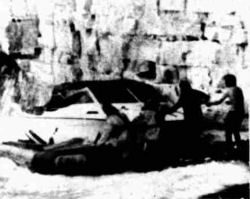
On the spot pictures our Chief Photographer, Bruce Seatle.
|
|
From the
https://www.kentonline.co.uk By Secret Drinker, 20 September 2019.
Secret Drinker reviews the Captain Digby pub, Kingsgate Bay, Broadstairs.
As a regular on the Viking Trail, I’ve cycled past the "Captain Digby,"
near Broadstairs, several times but have never ventured in.
Arriving on two wheels in lycra and with the sun still shining on the
righteous I decided to sit at a picnic bench outside. Fortunately for me
all the little darlings are now back in the hands of long-suffering
teachers so both the pub and garden were relatively empty apart from a
few token wrinklies.
You’re guaranteed great beach views, I could even see the wind farm.
Or at least they were until a legion of German exchange students invaded
the place and started ordering soft drinks to accompany their packed
lunches – I was certainly glad I got to the bar and placed my order
ahead of the masses from Bavaria.
There was a sign stating by order of the captain only food and drink
purchased on the premises can be consumed but clearly the captain was
turning a blind eye while I was in.
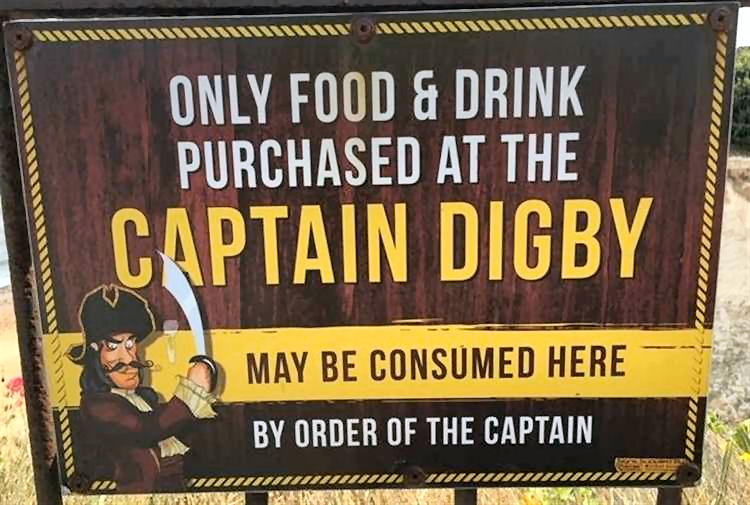
From my seat there was a spectacular view of the beach many feet below
and again, the additional signs making it crystal clear non-patrons
using the car park will be fined £150.
Popping inside to order I was informed Molly was my server and she
kindly offered me a taste of both the Adnams Ghost Ship and the Gadds No
7 that's brewed just up the road. Both were very good but I opted for
the former as it was just slightly tastier and fizzier, which suited my
mood. It had a thick, creamy head which stayed fresh right to the bottom
of the pint.
There is dark panelling everywhere and whilst the pub obviously prides
itself on being family friendly it also oozes historic charm. There is
not only a full-on indoor pirate playground for the sprogs but also an
extensive pirate-themed outside area too. And, to be fair, the pub’s so
vast and designed in such a way you hardly hear them.
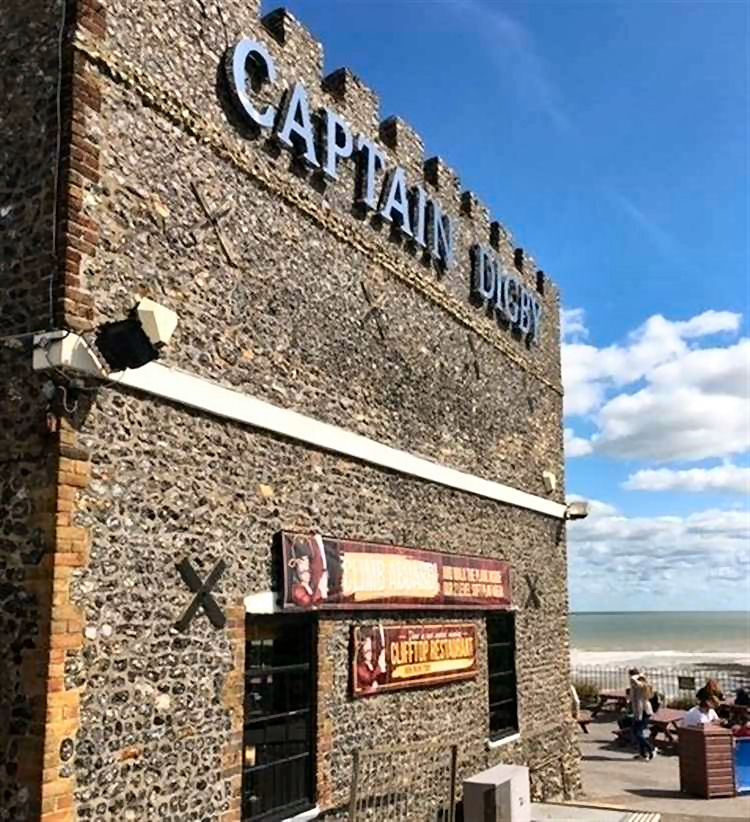
Captain Digby, near Broadstairs.
Having worked up an appetite and listened to reader’s requests for
details on the food as often as possible I scoured the menu.
I opted to start with a garlic bread and cheese which was fantastic,
ciabatta might not be everyone’s idea of the best base for this treat
but I really enjoyed it. I followed up with a tuna/sweetcorn jacket
potato. This was also good, though the skin did taste a little sweet, as
though it might have been coated in honey – the salad that came with it,
served in a small colander, was fresh and tangy.
There is a stack of seating, both inside and out, and the place must be
mobbed on a sunny Saturday. Inside I bumped into a couple of Sky
engineers installing cabling so it seems the current three screens I
spotted may be well be increasing in number.
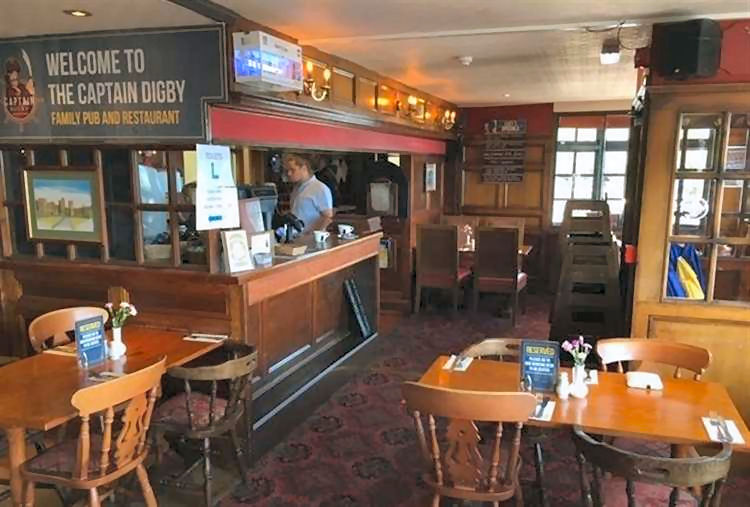
The main feature inside is dark wood panelling.
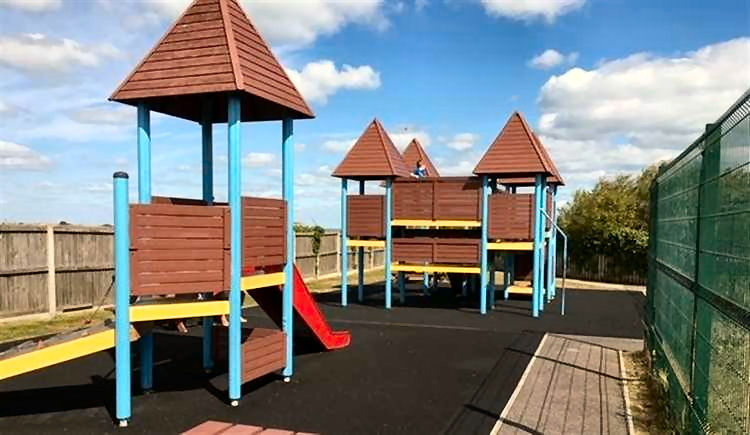
There are pirate-themed play areas both inside and outside at the
Captain Digby.
I did see a fruit machine but there is no pool table or darts – it
really is family orientated, so much so that I noticed there is a toilet
specifically for children. As a side note I think the height of the
picnic table benches is also set specially for children, or at least my
back thought this when I got up to leave!
The adult facilities were clean, tidy and fresh smelling with the usual
advertising posters we have come to expect. There’s also a massive car
to match the size of the venue, just make sure you heed the captain’s
warning and buy something from the pub.
This is a full on family pub that is proud to cater for the masses and
you can’t deny it does offer some spectacular seaside views.
Town pub reopened after 34 years under original name
Food is served daily from noon to 9pm, or 9.30pm on Saturdays
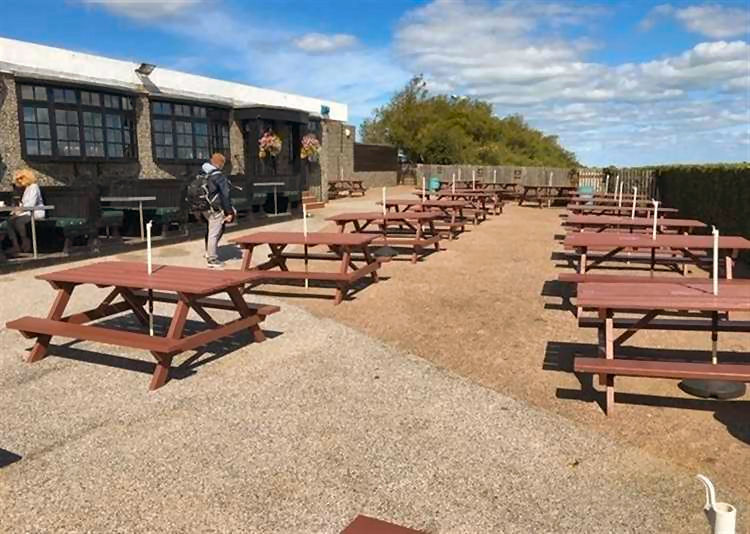
There are a sea of picnic tables available to those who want to dine
alfresco.
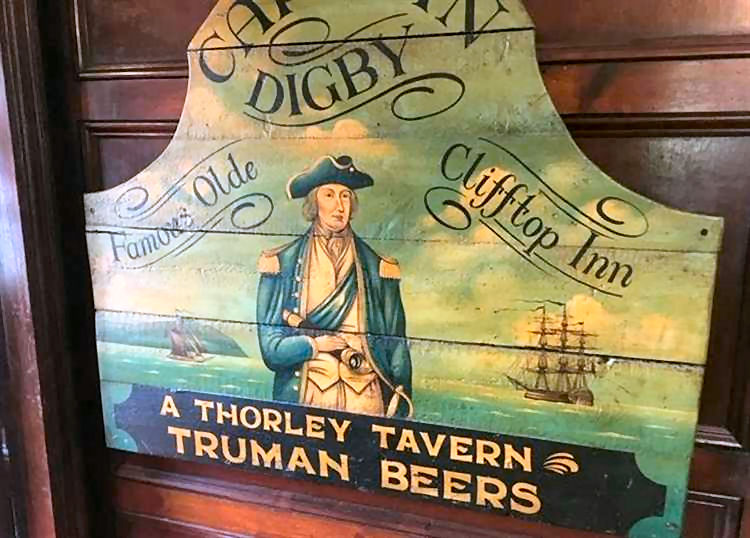
Captain Digby is proud to celebrate its clifftop history.
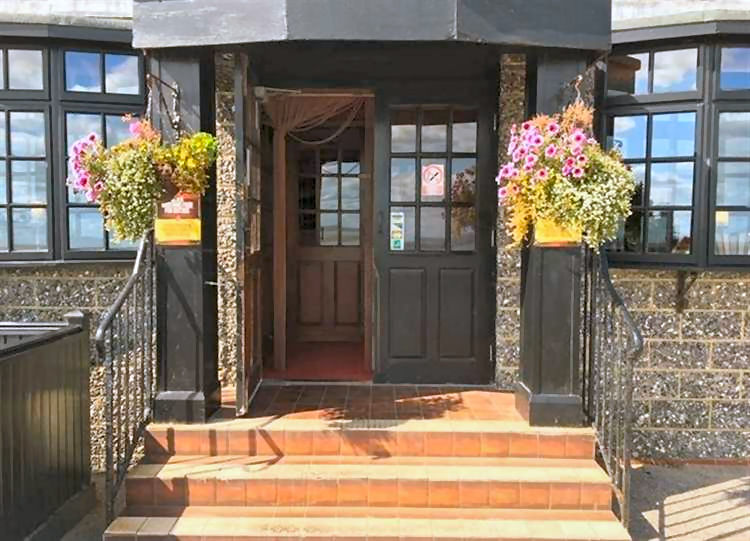
The side entrance has hanging baskets either side of the steps.
|
|
From an email received 5 December 2017.
We have a horse brass of the "Captain Digby." I am not sure of its
history as I inherited it from my mother. I recall going to Margate as a
child (55 years ago?) but don't know if it originates from that.
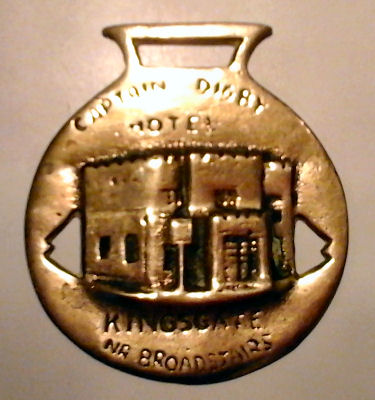 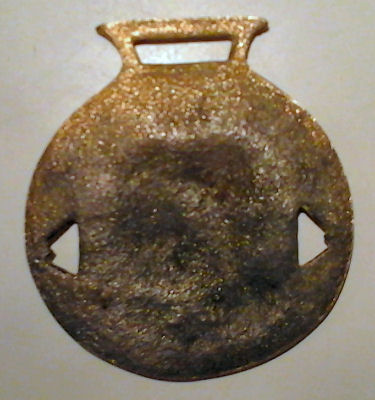
Would love to know the background of it if you know.
Regards,
Geoff Summers. |
LICENSEE LIST
HERBERT Mr 1797+
HILLS Richard 1823-51
HILLS Elizabeth 1851+ (widow age 73 in 1851 ) )
GODDEN George 1861-71+ (also farmer age 69 in 1871 ) )
WOODRUFF Sarah Mrs 1874+
DRAY Frank 1881-82+ (age 26 in 1881 ) )
DRAY Lilian Jane Mrs 1890-91+ (age 36 in 1891 ) )
DRAY Sillias J 1891+
SCOTT George E 1901-03+ (age 57 in 1901 ) )

HOBBY William George 1911-22+ (age 30 in 1911 ) )
LOVERSEED Bert 1925-28+

ALDRIDGE Alfred Victor May/1930-Sept/37

COOPER Lilla E 1939+ (age 37 in 1939)
SPARROWHAWK Frank "Alf" 1966-Dec/72
https://pubwiki.co.uk/CaptainDigby.shtml
 From the Kelly's Directory 1903 From the Kelly's Directory 1903
 Census Census
|







































